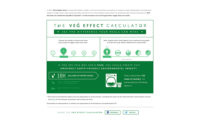Study: Two-thirds of U.S. consumers are eating less meat
Respondents with incomes lower than $25,000 were more likely to report cutting their overall meat consumption than those with household incomes greater than $75,000.

Two of every three participants are eating less of at least one type of meat, according to a study conducted by researchers at the Johns Hopkins Center for a Livable Future, Baltimore, Md.
The most commonly reported reasons participants gave for cutting meat consumption were cost and health concerns.
The study, conducted in 2015, is said to be the first of its kind to collect responses from U.S. consumers about the foods they choose to eat instead of meat during meatless meals. Findings published in the July 2018 issue of the Public Health Nutrition.
"Many Americans continue to have strong preferences for meat, but this survey adds to a growing body of evidence that a significant portion of the population may be purposefully reducing their meat consumption without becoming vegetarian or vegan," says Roni Neff, assistant professor at the Johns Hopkins Bloomberg School of Public Health and director of the center's Food System Sustainability and Public Health Program. "We hope our findings will be useful for the development of awareness campaigns and other interventions geared toward helping consumers reduce their meat consumption in a way that is good for their health, their grocery budgets and the environment."
To better understand consumer attitudes and behaviors related to reducing meat consumption, researchers collected survey responses from a nationally representative sample of 1,112 U.S. adults ages 18 and older. For purposes of the survey, researchers defined meat reduction as eating less red meat, processed meat, poultry or seafood over the past three years.
Participants between the ages of 45-59 were twice as likely to reduce consumption of one or more types of meat as those 18-29, followed by those over age 60. Women were more likely than men to report reducing meat consumption. Household income was also associated with reduced meat consumption—the lower the income level, the greater the likelihood of reporting reduced meat consumption.
Respondents with incomes lower than $25,000 were more likely to report cutting their overall meat consumption than those with household incomes greater than $75,000. Researchers also observed that the parents of children under age 18 were less likely to reduce their overall meat consumption than non-parents.
Researchers note that the responses offer useful insights into which meat products consumers say they are cutting back on. For instance, 55% of respondents reported reducing their consumption of processed meat, while 41% reported reducing the amount of red meat in their diets. Of those who reported reducing red and processed meat, 37% said they increased their poultry or seafood consumption.
The most commonly reported approach to reducing meat consumption was buying less meat (64%), followed by smaller portion sizes (56%), meatless meals (42%), meatless days (32%) and avoiding meat altogether (9%).
"Our survey results suggest that public health messages on the benefits of reducing red and processed meat consumption may be reaching and resonating with many U.S. consumers, but more work remains to be done," Neff says. "Priorities for meat reduction campaigns should include addressing common misperceptions about meatless meals, and promoting alternatives that consumers enjoy and that are affordable, healthy and environmentally friendly. They should emphasize that meatless meals can be interesting and taste good, and could also provide resources like recipes with other options."
The research was funded by the GRACE Communications Foundation, New York.
Looking for a reprint of this article?
From high-res PDFs to custom plaques, order your copy today!





